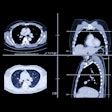Dear AuntMinnie Member,
A new PET radiotracer under development could be an improvement for imaging of patients with recurrent prostate cancer by enabling physicians to spot the return of disease in men with very low prostate-specific antigen (PSA) levels.
Prostate cancer recurs in up to one-third of men who are treated, but conventional imaging has a hard time localizing disease in patients with low PSA levels. The new radiotracer, an experimental radiohybrid prostate-specific membrane antigen ligand, showed improved performance in a recent clinical study. Our coverage of the research was the top story on AuntMinnie.com for the past week.
You'll find a wealth of other coverage of nuclear medicine and molecular imaging in our Molecular Imaging Community. Researchers from Massachusetts General Hospital used PET/CT to find a connection between stress and a person's risk of Takotsubo syndrome, also known as "broken heart" syndrome.
A Dutch team examined solutions to stem the declining number of residents who are pursuing nuclear medicine as a specialty, while a group from Singapore investigated the safety and efficacy of a new radiopharmaceutical based on lutetium-177 that could be used to treat neuroendocrine tumors.
Get these stories and more in your Molecular Imaging Community.
WHO weighs in on CAD
Tuberculosis (TB) remains a serious problem in many parts of the developing world. There are programs in place to screen for TB, but they can be hampered by a lack of qualified personnel to interpret chest x-ray images.
Enter computer-aided detection (CAD). CAD could be used in TB screening to analyze images acquired at remote locations and flag the ones that should be interpreted by experienced personnel.
That's the model recommended by the World Health Organization (WHO) in a briefing this past week. The recommendation could be a big boost, both for developers of CAD software and for TB screening programs.
While you're in our Digital X-Ray Community, be sure to check out our coverage of a new study that found that interpretations of chest x-rays in the U.S. government's black lung screening program can be affected by who's paying for the studies.
And our friends at Healthcare Administrative Partners have provided an update on evaluation and management codes for interventional radiology.
These stories are all available in our Digital X-Ray Community.
Incidental MRI findings
Finally, visit our MRI Community for a new article on how to manage incidental findings on the MRI scans of children. Researchers found a high rate of incidental findings on pediatric brain MRI scans, but few of them were actually a health threat.



















